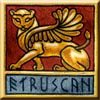
Mlacuch is another Etruscan Goddess about Whom not a lot is known. She appears on a single mirror-back of the 5th century BCE with hercle, the Etruscan name for herakles or hercules. On the mirror, Hercle is hefting her off over his shoulder, in an abduction scene from a tale that has not come down to us. The Greek legends of Herakles were familiar to the Etruscans, who had contact with the settlers of Magna Graecia in southwestern Italy, and under the name Hercules, the Roman version of the Etruscan name, he came to be seen as a great hero in Roman myth, and his legend accrued even more tall tales. Mlacuch (also spelled Mlacux) means "She Who Pleases", and there are many related words in Etruscan, such as mlaxta, "pleasant, pleasing", mlaxuta, "pleasing thing", and mlax-uta, "beautiful, noble". Other related words have connotations of things that are pleasant or proper to the Gods, such as mlax, "votive gift or offering", mlakas, "[he] has offered", and mulax, "funerary offerings", the latter also being another interpretation of Mlacuch's name. One of Herakles's many, many Labors was to go fetch Kerberos, the three-headed dog guarding the entrance to the Underworld. Given Mlacuch's funerary and therefore Underworld connotations perhaps the lost Etruscan story has something to do with Hercle's journey there, possibly with Mlacuch Herself as some sort of offering or sacrifice, but that's just a guess. Hercles was also famous for abducting and raping women, like Auge, a priestess of Athene in Tegea; Astydamia, daughter of Amyntor of Ormenius; and Astyokheia, the daughter of the King of Ephyra. he was also said to have had several wives and to have fathered about a zillion-and-a-half children; probably these stories were invented so that every city could claim to have a founder or famous citizen descended from Herakles. At any rate, he was known for forcing himself on women on a regular basis, and perhaps the depiction of him carrying off Mlacuch refers to a similar act. Perhaps, though, that is being too hard on Hercle—it could equally be a scene of rescue. On the mirror-back, Mlacuch is depicted as young and beautiful, dressed in a long chiton and flowing drapery, and wearing a stephane or headband, straight out of Greek fashion. She certainly does look pleasing, and the last possibility is that this mirror does not depict a Goddess at all, but that "mlakukh" is merely descriptive of the woman's beauty. Alternate spellings: Mlacuch, Mlacux. |
|
|



